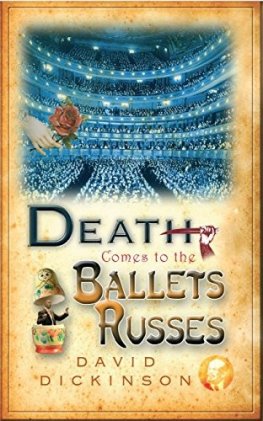David Dickinson - Death at the Jesus Hospital
Here you can read online David Dickinson - Death at the Jesus Hospital full text of the book (entire story) in english for free. Download pdf and epub, get meaning, cover and reviews about this ebook. genre: Detective and thriller. Description of the work, (preface) as well as reviews are available. Best literature library LitArk.com created for fans of good reading and offers a wide selection of genres:
Romance novel
Science fiction
Adventure
Detective
Science
History
Home and family
Prose
Art
Politics
Computer
Non-fiction
Religion
Business
Children
Humor
Choose a favorite category and find really read worthwhile books. Enjoy immersion in the world of imagination, feel the emotions of the characters or learn something new for yourself, make an fascinating discovery.

- Book:Death at the Jesus Hospital
- Author:
- Genre:
- Rating:5 / 5
- Favourites:Add to favourites
- Your mark:
- 100
- 1
- 2
- 3
- 4
- 5
Death at the Jesus Hospital: summary, description and annotation
We offer to read an annotation, description, summary or preface (depends on what the author of the book "Death at the Jesus Hospital" wrote himself). If you haven't found the necessary information about the book — write in the comments, we will try to find it.
Death at the Jesus Hospital — read online for free the complete book (whole text) full work
Below is the text of the book, divided by pages. System saving the place of the last page read, allows you to conveniently read the book "Death at the Jesus Hospital" online for free, without having to search again every time where you left off. Put a bookmark, and you can go to the page where you finished reading at any time.
Font size:
Interval:
Bookmark:
David Dickinson
Death at the Jesus Hospital
PART ONE
1
When there is no moon in January the dawn creeps in very slowly like the second hand on a clock that is running slow. By the River Thames at Marlow in Buckinghamshire, some twenty miles from London, the trees reveal themselves gradually. The water in the river begins to show its patterns and its ripples. The screeches of the owls, strident and imperious, fall away. In the great houses by the waters edge the housemaids are awake early, cleaning out last nights fires and preparing new ones. The kitchen staff are beginning work on the servants breakfast, always served before the master and his family in the servants hall. A couple of early risers could be seen striding towards the railway station to catch the first train to the capital.
Some in the Jesus Hospital on the outskirts of the little town were also awake early on this morning, the twenty-second of the month. It is neither a church nor a chapel, nor are the sick healed within its red brick walls. Jesus Hospital is an almshouse, founded in the early seventeenth century by a rich London merchant called Thomas Gresham whose portrait hangs in state in the dining hall, all black cloak and feathered hat. In shape, the hospital resembles the court of many a Cambridge college, also built around this time, a rectangular structure of two storeys whose walls are now covered in red ivy. Twenty male persons over the age of sixty are resident here, each man with a small apartment of his own, consisting of a living room and primitive kitchen on the ground floor and a bedroom and bathroom above. There is a simple entrance examination: to gain admission candidates have to be able to recite the Lords Prayer and the Apostles Creed from memory. Some of the inmates pay no rent at all for the privilege of living in the Jesus Hospital and receive a weekly allowance; others who are better off make a small contribution. The founder, Mr Gresham, was not only one of the wealthiest men in the City of London, he was also Prime Warden of the Ancient Mistery of Silkworkers, one of the oldest livery companies in the City, founded in the fourteenth century. The Jesus Hospital was run and administered by the Silkworkers Company. Their officers selected the future inmates and the warden who ran it.
In Number Four, Bill Smith, known to all as Smithy, who had spent his working life on a farm near Marlow, was reading his bible. He began every day in this fashion. This was the third time Bill had gone through the good book. Rather like the people who painted the Forth Bridge, a task that took so long that the workers had to go back to the beginning once they had reached the end, Smithy had discovered that once he finished the Book of Revelation at the end of the New Testament, he had totally forgotten the Book of Genesis. So he went back to the beginning, thinking very occasionally that he might, just might, have read this section before.
In Number Seventeen, Josiah Collins was saying his prayers, kneeling on the threadbare carpet in his room. On his last visit to the doctor it was one of the rules of the hospital that every man had to go for a check-up every six months Josiah had been told that he had not very long to live. He might make it to the spring, he might not, the doctor had said in the special voice he used for the very old and the very nearly dead. Every morning now Josiah, who had found God late in life during a hellfire sermon in Hackney, said the Lords Prayer and the collect for the day and read aloud from the Prayers for the Sick. This usually left him feeling better until the middle of the morning when despair returned. Sometimes Johnny Johnston would take him to the Rose and Crown when it opened just after twelve oclock to ease his sorrows, sometimes he walked down Ferry Lane and stared at the passing river. By two thirty in the afternoon Josiah was always sleep.
The repose of those still sleeping in the other numbers between one and twenty in the Jesus Hospital was shattered by a scream. Or rather, by a whole series of screams that sounded as though they would never end. Nellie the kitchen maid was just beginning to lay the tables for breakfast tea, porridge, two sausages and toast on this occasion when she saw the body lying across the table nearest the kitchen in the dining hall. At first she thought the body might have fallen asleep. That would have been unusual but not impossible, for several of the old gentlemen were known for falling asleep in the most unlikely places. It was only when she saw the blood dripping very slowly from the bodys neck to make red marks on the floor that she realized the man was dead. It was Abel Meredith from Number Twenty. He had been an inmate of the hospital for less than six months. Meredith was leaving it in the most dramatic possible style, lying dead across one of the hall tables, his throat cut from ear to ear. The less squeamish among the residents realized that he must have been murdered elsewhere and the body brought here, for there was not very much blood. If the knife had passed across his throat in this room the floor would have been awash with dark red liquid, running down the slight slope of the floorboards.
The screams alerted all those who were already dressed to head for the hall. The others peered out of their upstairs windows and got themselves ready as fast as they could. In their blue coats with white buttons down the centre, the official uniform of the silkmen, as they were known, the old gentlemen gathered inside the main door of the hall and stared at their late colleague. Those who had served in the military were the least shocked. A few of them gazed at the corpse and were suddenly transported back to the battlefields where they had fought as young men and seen the bodies of their fallen comrades. For the silkmen whose lives had been more prosaic, spent in field or counting house, this was the first murdered man they had ever encountered. The Catholics among the inmates crossed themselves and began saying Hail Marys. There was a low murmur from the watchers as they exchanged views in whispers. One or two of them looked suspiciously at their colleagues as if they knew they had a murderer in their midst.
One of the last to arrive should have been the first. Thomas Monk, Warden of the Hospital, sprinted across the grass and blew loudly on his whistle to break the stifled screams and the sighs of the newcomers as they peered into the hall. He always found a whistle useful when communicating with the very old and the very deaf among his flock. Thomas had spent most of the previous evening playing cards for money in the snug of his local pub and his winnings had almost been wiped out by the number of rounds of drinks he had to buy for the losers. Monk acted fast when he saw the body and checked that Meredith was dead.
Silkmen, he began, we should leave this terrible sight at once. Come with me now to the chapel where we may rest in peace and say our prayers while we wait for the authorities to arrive.
Monk escorted his charges to the chapel on the opposite side of the little court, and then walked as fast as he could to his office on the right-hand side of the entrance. He was of average height with black curly hair and a piratical beard. He was full of nervous energy, so restless that some of the silkmen complained that they felt tired even looking at him. Of all the inmates of the Jesus Hospital, Thomas Monk had the most to fear. He had lied about his past when he applied for this job three years ago. Had he told the truth he would never have obtained the position. Now, as Thomas Monk reminded himself of his activities since he arrived, he shuddered at the thought of policemen crawling all over the hospital, checking everything, asking questions, digging into peoples pasts. He wondered if, as Warden, he could be above suspicion, but he doubted it. He checked the coast was clear with a guilty smile and locked his door. He poured himself a very large glass of whisky and downed about a third of it in one gulp. That was better. Monk picked up his telephone and began shouting into it as loudly as he could. The instrument had only recently arrived at the hospital. Monk had never believed anybody would be able to hear at the other end if he spoke in a normal voice. Regular recipients of his calls used to hold the receiver at arms length. He would, they told themselves, get used to the telephone in time. The doctor and the policeman he asked to come at once. He left a message at the Silkworkers Hall in London, saying there was a crisis at the Jesus Hospital and requesting a senior officer of the company to come as soon as possible.
Font size:
Interval:
Bookmark:
Similar books «Death at the Jesus Hospital»
Look at similar books to Death at the Jesus Hospital. We have selected literature similar in name and meaning in the hope of providing readers with more options to find new, interesting, not yet read works.
Discussion, reviews of the book Death at the Jesus Hospital and just readers' own opinions. Leave your comments, write what you think about the work, its meaning or the main characters. Specify what exactly you liked and what you didn't like, and why you think so.




